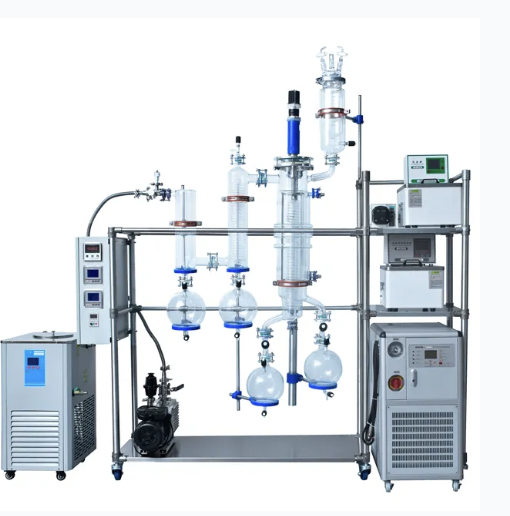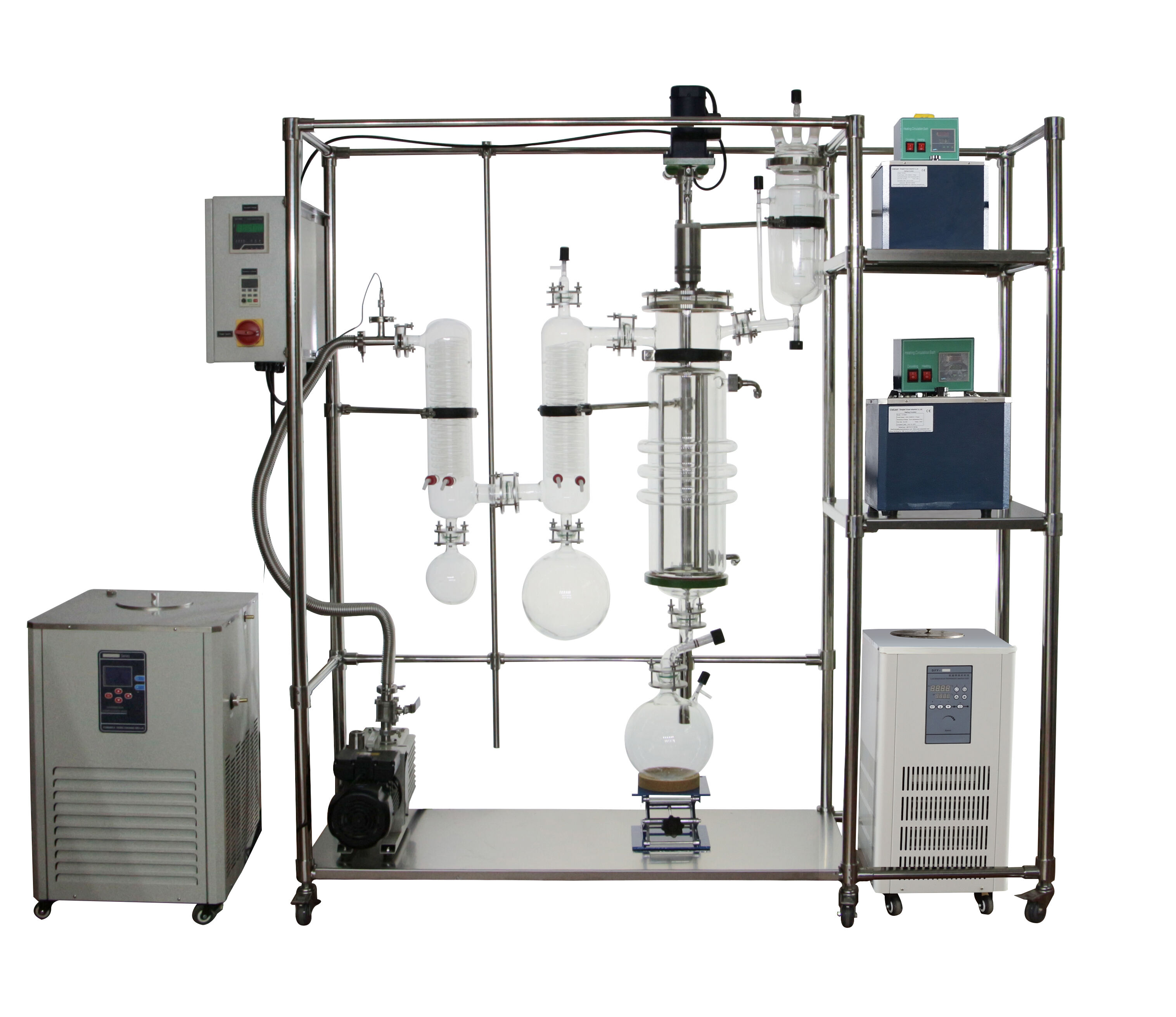সক্রিয় যৌগগুলি রক্ষা করে অপদ্রব্য অপসারণ
নিম্নচাপে কোমল পৃথকীকরণ
যখন আমাদের উপকরণগুলিকে যতটা তাপ প্রদান করা হয় তা সীমিত করার প্রয়োজন হয়, তখন ভ্যাকুয়াম আংশিক পাতন একটি গুরুত্বপূর্ণ ভূমিকা পালন করে, যা বাষ্পীভূত হওয়া বা ক্ষতিগ্রস্ত হওয়া উপকরণগুলি নিয়ে কাজ করার সময় বিশেষভাবে গুরুত্বপূর্ণ। এই প্রক্রিয়াটি কাজ করে কম চাপের অবস্থা তৈরি করে, যা আসলে বস্তুগুলির স্ফুটনাঙ্ক কমিয়ে দেয়। এটি তাপে ক্ষতিগ্রস্ত হওয়া থেকে সংবেদনশীল উপাদানগুলি রক্ষা করতে সাহায্য করে। এই পদ্ধতির একটি নির্দিষ্ট ধরন যা Wiped Film Molecular Distillation নামে পরিচিত, জনপ্রিয়তা অর্জন করেছে কারণ এটি ব্যাচগুলি দ্রুত প্রক্রিয়া করার সময় শক্তি সাশ্রয় করে। এই পদ্ধতিটি এত ভালোভাবে কাজ করে কারণ এটি ঘূর্ণায়মান ওয়াইপার ব্লেড ব্যবহার করে উপকরণটিকে একটি অত্যন্ত পাতলা স্তরে পরিণত করে এবং উষ্ণ পৃষ্ঠের উপর ছড়িয়ে দেয়। এই ব্যবস্থাটি অপারেটরদের পাতন প্রক্রিয়ার সময় কী ঘটছে তা নিয়ন্ত্রণে রাখতে সাহায্য করে। বৃহত্তর উৎপাদন চলাকালীন প্রস্তুতকারকদের জন্য, এই পদ্ধতি ব্যবহার করে তারা বেশি পরিমাণ প্রক্রিয়া করতে পারেন এবং পণ্যের মান কমাতে হবে না। সবচেয়ে গুরুত্বপূর্ণ বিষয় হল এটি চূড়ান্ত পণ্যে মূল্যবান সক্রিয় উপাদানগুলি ঠিক তেমনই রাখে যেমনটি প্রত্যাশিত ছিল।
বিভিন্ন শিল্পে পণ্যের মান এবং উৎপাদন মাত্রা উন্নত করতে মার্জিত ফিল্ম ডিস্টিলেশন একাধিকবার নিজেকে প্রমাণিত করেছে। ক্যানাবিস নিষ্কাশন হল এমন একটি বাস্তব উদাহরণ যেখানে এই পদ্ধতি সফলভাবে প্রয়োগ করা হয়। এই প্রক্রিয়াটি উদ্ভিদ উপাদান থেকে টেট্রাহাইড্রোক্যানাবিনল (THC) এবং ক্যানাবিডিওল (CBD) এর মতো যৌগগুলি দক্ষতার সঙ্গে পৃথক করে, যখন পণ্যগুলির স্বতন্ত্র গন্ধ এবং স্বাদ বৈশিষ্ট্যের জন্য দায়ী টারপেনগুলি ক্ষতিগ্রস্ত হয় না। এই প্রযুক্তি যে কারণে স্পষ্ট হয়ে ওঠে তা হল এর গতি এবং নির্ভুলতার মধ্যে সঠিক ভারসাম্য। উৎপাদনকারীরা উৎপাদন পরিমাণ উল্লেখযোগ্য পরিমাণে বাড়াতে পারেন এবং সেইসাথে অনেক বাজারের নিয়ন্ত্রক কর্তৃপক্ষের দ্বারা আরোপিত কঠোর মান নিয়ন্ত্রণ বজায় রাখতে পারেন।
দূষিত পদার্থের লক্ষ্যযুক্ত অপসারণ
আসল জিনিসগুলো অক্ষত রেখে নির্দিষ্ট দূষণ দূর করার জন্য ডিস্টিলেশন সিস্টেমগুলিতে লক্ষ্যবস্তু পৃথকরণ কাজ করে। যখন আমরা মলেকুলার ডিস্টিলেশন নিয়ে কথা বলি, তখন তাপমাত্রা এবং চাপ খুব সাবধানে নিয়ন্ত্রণ করা হয়। এই প্রক্রিয়াটি মিশ্রণ থেকে আমরা যা চাই তার শক্তি বা মানকে না ছুয়েই অবাঞ্ছিত অংশগুলো সরিয়ে দেয়। যেসব খাতে পবিত্রতা কোনও ভাবেই কমানো যায় না সেখানে এই পদ্ধতি খুবই গুরুত্বপূর্ণ। কল্পনা করে দেখুন ওষুধ তৈরির ক্ষেত্রে ওষুধ প্রস্তুতকারক কোম্পানিগুলো বা খাদ্য পরিপূরক তৈরির ক্ষেত্রে নিউট্রাসিউটিক্যাল প্রস্তুতকারকদের কথা। তাদের কাছে এমনকি ক্ষুদ্রতম অশুদ্ধিও ভবিষ্যতে বড় সমস্যার কারণ হতে পারে, তাই তারা প্রতিবার পরিষ্কার ফলাফল দেওয়া পদ্ধতির উপর ভরসা করেন।
সংখ্যাগুলি পণ্যের বিশুদ্ধতা উন্নত করার জন্য এটি কতটা কার্যকর হয় সে সম্পর্কে আমাদের কাছে কিছু গুরুত্বপূর্ণ তথ্য দেয়। আসবাব ব্যবস্থা দূষণকারী পদার্থগুলিকে খুব উচ্চ হারে অপসারণ করে দিতে পারে, যার ফলে পণ্যগুলি মোটের উপর আরও নিরাপদ এবং কার্যকর হয়ে ওঠে। শিল্প বিশেষজ্ঞরা প্রক্রিয়াকরণের সময় তাপমাত্রা নিয়ন্ত্রণ এবং ফিল্মটি কতটা ঘন হয়ে যায় এমন বিষয়গুলিকে অবাঞ্ছিত অংশগুলি অপসারণের ক্ষেত্রে প্রধান কারক হিসাবে উল্লেখ করেন। যখন উত্পাদকরা এই পরিবর্তনশীল গুলি ঠিক মতো সামঞ্জস্য করেন, তখন তারা একটি শক্তিশালী কিন্তু সতর্ক পৃথকরণ প্রক্রিয়া বজায় রাখেন। এর মানে হল মিশ্রণের মধ্যে যা কিছু মূল্যবান রয়েছে তা ক্ষতি না করেই ভালো জিনিসগুলি অক্ষুণ্ণ রেখে খারাপ জিনিসগুলি বাতিল করে দেওয়া।
কম তাপ প্রকাশের মাধ্যমে আণবিক অখণ্ডতা রক্ষা করা
তাপজনিত ক্ষয় এড়ানো
সংবেদনশীল রাসায়নিক যৌগ নিয়ে কাজ করার সময় তাপমাত্রা নিয়ন্ত্রণ অনেক গুরুত্বপূর্ণ ভূমিকা পালন করে, কারণ অতিরিক্ত তাপ সেগুলির আণবিক গঠনকে ভেঙে ফেলতে পারে। শীতল রাখলে এই সমস্যা এড়ানো যায় এবং অণুগুলি স্থিতিশীল থাকে। ওষুধ তৈরির গবেষণাগারগুলি থেকে পাওয়া তথ্য দেখায় যে তাপজনিত ক্ষতি রোধ করা আসলে পণ্যগুলির কার্যকারিতা বাড়ায়। ধরুন ওষুধ উৎপাদনের ক্ষেত্রে, যদি কোম্পানিগুলি উৎপাদনের সময় কম তাপমাত্রা বজায় রাখে, তবে গুরুত্বপূর্ণ উপাদানগুলি ভেঙে যাওয়া থেকে রক্ষা পায়, তাই রোগীরা যখন ওষুধটি নেয় তখন তা ঠিকমতো কাজ করে। বিভিন্ন শিল্পে এখন এই তাপমাত্রা পরিচালনার পদ্ধতিগুলি গ্রহণ করা হচ্ছে, কেবলমাত্র মান নিয়ন্ত্রণের জন্য নয়, বরং গ্রাহকরাও নির্ভরযোগ্য ফলাফলের আশা করেন। যখন মানুষ জানে যে তাদের ওষুধ বা পরিপূরকগুলি খারাপভাবে পরিচালিত হওয়ার কারণে ক্ষমতা হারাবে না, তখন তারা সেসব ব্র্যান্ডের সঙ্গে থাকে যেগুলি স্থিতিশীল কর্মক্ষমতা দেয়।
সংবেদনশীল পদার্থের জন্য অপরিহার্য
কিছু উপকরণগুলি তাপের জন্য খুবই কোমল, তাই আসবানের সময় তাপমাত্রা নিয়ন্ত্রণ করা প্রয়োজন। ক্যানাবিনয়েডস, আবশ্যিক তেল, সেই জটিল ভিটামিনগুলির মতো জিনিসগুলি যা সম্প্রতি অনেক আলোচিত হয়েছে তাদের বিশেষ গুণাবলী রক্ষা করতে অত্যধিক তাপ থেকে রক্ষা করা প্রয়োজন। এই জিনিসগুলি নিয়ে কাজ করা অধিকাংশ মানুষই জানেন যে সবকিছু অক্ষুণ্ণ রাখতে তাপমাত্রা নিয়ন্ত্রণ করা খুবই গুরুত্বপূর্ণ। তারা সাধারণত ধীরে ধীরে উত্তপ্ত করার পদ্ধতি এবং কখনও কখনও ভ্যাকুয়াম সেটআপ ব্যবহার করে সমস্যার সমাধান করে থাকেন। বিভিন্ন উপকরণের জন্য কতটা তাপ সহ্য করা যাবে না তার শিল্পে নিয়ম রয়েছে এবং সেই নির্দেশাবলী মেনে চলাটা নিরাপদ, উচ্চমানের চূড়ান্ত পণ্য উৎপাদনের ক্ষেত্রে পার্থক্য তৈরি করে। যারা সংবেদনশীল যৌগিক পদার্থ নিয়ে কাজ করেন, তাদের কাছে তাপমাত্রা নিয়ন্ত্রণ কেবল গুরুত্বপূর্ণ নয়, ভালো ফলাফলের জন্য এটি অপরিহার্য।
উচ্চ-শুদ্ধতা, ঘনীভূত পণ্য অর্জন
নিখুঁত ভগ্নাংশ নিয়ন্ত্রণ
ফ্র্যাকশনেশন ডিস্টিলেশন প্রক্রিয়ার মূল অংশ যখন কোম্পানিগুলি সুপার পিউর চূড়ান্ত পণ্যগুলি পেতে চায়। মূল ধারণাটি বিভিন্ন যৌগগুলিকে পৃথক করে কারণ তাদের ভিন্ন ভিন্ন তাপমাত্রায় ফুটে ওঠে, তাই প্রতিটি অংশ ঠিক কোথায় যাওয়া উচিত তা সংগ্রহ করা হয়। উইপড ফিল্ম মলিকুলার ডিস্টিলেশন এটিকে আরও এগিয়ে নিয়ে যায় কারণ এটি উপকরণগুলিকে পাতলা ফিল্মে ছড়িয়ে দেওয়া এবং পৃথকীকরণের সময় আরও ভাল নিয়ন্ত্রণের জন্য বাষ্পীভবনকে ত্বরান্বিত করার মতো পদ্ধতি ব্যবহার করে। ঘূর্ণায়মান উইপার ব্লেডগুলির উদাহরণ দিন, তারা পৃষ্ঠের উপর সমস্ত কিছু সমানভাবে ছড়িয়ে দেয়, নিশ্চিত করে যে উপকরণটি একটি সামঞ্জস্যপূর্ণ স্তর গঠন করে যা এলোমেলোভাবে পুলিংয়ের চেয়ে অনেক ভাল কাজ করে। আমরা বারবার দেখেছি যে এই ফ্র্যাকশনেশন সঠিকভাবে করা শুদ্ধতার স্তরে সমস্ত পার্থক্য তৈরি করে, যা সরাসরি চূড়ান্ত পণ্যটি কতটা শক্তিশালী বা স্থিতিশীল হবে তা প্রভাবিত করে। ওষুধ প্রস্তুতকারক এবং ক্যানাবিস প্রসেসরগণ এই পদ্ধতিগুলির উপর ভারীভাবে নির্ভর করে যেহেতু তাদের গ্রাহকরা নিখুঁততার চেয়ে কম কিছু মেনে নেন না, এবং ফ্র্যাকশনেশনে ক্ষুদ্রতম পার্থক্যগুলি মান পরীক্ষা পাস করা এবং পুনরায় শুরু করার মধ্যে পার্থক্য করতে পারে।
চূড়ান্ত গঠনে স্থিতিশীলতা
বিভিন্ন পণ্য ব্যাচের মধ্যে রাসায়নিক গঠন স্থিতিশীল রাখা নির্ভরযোগ্য ফলাফলের জন্য খুবই গুরুত্বপূর্ণ। উৎপাদনের সময় তাপমাত্রা এবং চাপ কঠোরভাবে নিয়ন্ত্রিত হওয়ার পরিবেশ তৈরির ক্ষেত্রে মলিকুলার ডিস্টিলেশনের একটি বড় ভূমিকা রয়েছে। প্রস্তুতকারকরা তাছাড়া তাৎক্ষণিক মনিটরিং সরঞ্জাম এবং প্রতিক্রিয়াশীল প্রতিক্রিয়া পদ্ধতির উপর নির্ভর করেন যাতে প্রতিটি কিছু একরূপ থাকে এবং কোনও ব্যাচ প্রতিশ্রুত মান পূরণ করে না। এফডিএসহ নিয়ন্ত্রক সংস্থাগুলি গুণগত নিয়ন্ত্রণের জন্য বেশ কঠোর নির্দেশিকা প্রতিষ্ঠা করেছে, যা যৌক্তিক কারণ হল ভোক্তাদের প্রয়োজন যে তাদের পণ্যগুলি আনুমানিক কাজ করবে। যখন কোম্পানিগুলি এই নিয়মগুলি নিবিড়ভাবে অনুসরণ করে, তখন তারা পণ্যগুলি সরবরাহ করে যা গ্রাহকদের প্রত্যাশিত মানগুলি প্রথম দিন থেকে পঞ্চাশতম দিন পর্যন্ত স্থিতিশীলভাবে পূরণ করে।
শেষ- পণ্য ক্ষমতা
কোনো শেষ পণ্য কতটা শক্তিশালী হয়ে ওঠে সেটি আসলে নির্ভর করে তার উপাদানগুলি কতটা বিশুদ্ধ তার উপর। আর এই বিশুদ্ধতা নির্ভর করে প্রক্রিয়াজাতকরণের সময় কোন ধরনের আংশিক পাতন পদ্ধতি প্রয়োগ করা হয় তার উপর। উদাহরণস্বরূপ, মলিকুলার ডিস্টিলেশনের ওইপড ফিল্ম পদ্ধতি পণ্যের শক্তি বাড়ানোর ব্যাপারে বেশ কার্যকর। পরীক্ষার ফলাফল দেখলে দেখা যায় যে এই উন্নত পদ্ধতি এবং আদর্শ পদ্ধতির মধ্যে বেশ ফারাক রয়েছে। আরও ভালোভাবে পাতিত পণ্যগুলি সবসময় শক্তিশালী হয়ে থাকে। শিল্প পেশাদারদের জানা আছে যে, তাপমাত্রা এবং উপাদানগুলি সিস্টেমের মধ্যে দিয়ে যাওয়ার গতির মতো বিষয়গুলি নিয়ন্ত্রণ করে প্রকৃতপক্ষে পণ্যের কার্যকারিতা বাড়ানো যায়, যার ফলে গ্রাহকদের জন্য আরও ভালো কিছু তৈরি হয়। এমন সব খাতায় যেখানে গ্রাহকদের কাছে কার্যকারিতা সবথেকে বেশি গুরুত্বপূর্ণ, সঠিক পাতন পদ্ধতি নির্বাচন কেবল গুরুত্বপূর্ণ নয়, বরং এটি অত্যন্ত প্রয়োজনীয়।

শেলফ লাইফ এবং পণ্যের কার্যকারিতা বৃদ্ধি করা
উন্নত স্থায়িত্ব এবং কার্যকারিতার জন্য প্রধান প্যারামিটারগুলি
একটি পণ্যের শেলফ লাইফ এবং এটি কতটা কার্যকর থাকে সেটি অনেকগুলি গুরুত্বপূর্ণ বিষয়ের উপর নির্ভর করে যেমন জারণ, আর্দ্রতা প্রবেশ এবং তাপমাত্রা স্থিতিশীল রাখা। মলিকুলার ডিস্টিলেশন পদ্ধতিতে ফিল্ম মুছে ফেলা হয় এমন পদ্ধতি এগুলি সমাধানে বেশ ভালো ভূমিকা পালন করে। প্রক্রিয়াটি মূলত সেইসব উদ্বায়ী যৌগগুলি অপসারণ করে যা সময়ের সাথে পণ্যটি ভেঙে দেয়, যার ফলে উত্পাদকদের জন্য দীর্ঘস্থায়ী ফলাফল পাওয়া যায়। ল্যাবে করা কিছু পরীক্ষায় দেখা গেছে যে যখন প্রতিষ্ঠানগুলি ভালো ডিস্টিলেশন পদ্ধতিতে পরিবর্তন করে, তখন তাদের পণ্যগুলিতে জারণ অনেক ধীরে ধীরে ঘটে। এটি অর্থ করে যে পণ্যগুলি দীর্ঘ সময় ধরে স্থিতিশীল থাকে, যা রসায়নবিদদের থেকে শুরু করে গুদামের ম্যানেজারদের পর্যন্ত সবাইকে সুবিধা দেয়।
দীর্ঘমেয়াদী স্থিতিশীলতা উন্নতি
মলিকুলার ডিস্টিলেশন পদ্ধতি ব্যবহার করে ফিল্ম মুছে ফেলা হয়, যা শেলফ লাইফ বাড়াতে অ্যাডভান্সড ডিস্টিলেশন পদ্ধতিগুলির মধ্যে সবচেয়ে বেশি প্রতিনিধিত্ব করে। এই পদ্ধতি কাজ করার নীতি আসলে ঐতিহ্যগত পদ্ধতির তুলনায় বেশি ভালোভাবে পরিষ্কার করে, যা পণ্যের মানকে ক্ষতিগ্রস্ত করতে পারে এমন অবাঞ্ছিত পদার্থগুলি কমিয়ে দেয়। কিছু খাদ্য উত্পাদনকারী প্রতিষ্ঠান এই পদ্ধতি ব্যবহার করে বাস্তব ফলাফল পেয়েছে, যেমন কিছু কিছু প্রতিবেদনে বলা হয়েছে যে তাদের তেল প্রক্রিয়াজাতকরণের পর মাসের পর মাস তাজা থাকে। আইসিএইচ এর মতো সংস্থাগুলি কঠোর পরীক্ষার নির্দেশিকা অনুসরণ করে এমন কোম্পানিগুলি দেখেছে যে তাদের পণ্যগুলি স্থিতিশীলতা পরীক্ষায় অনেক বেশি নির্ভরযোগ্যভাবে পাশ করে যখন তারা উৎপাদন লাইনে আধুনিক ডিস্টিলেশন পদ্ধতিগুলি অন্তর্ভুক্ত করে।
আধুনিক পদ্ধতি ব্যবহার করে উন্নত পণ্যের মান প্রয়োগ
ঔষধ ও পুষ্টিসার বিশুদ্ধতা
ফার্মা এবং নিউট্রাসিউটিক্যাল খাতগুলির ক্ষেত্রে সর্বদা পরিশোধনের অত্যন্ত কঠোর মান রয়েছে, কারণ মানুষের স্বাস্থ্য সরাসরি ঝুঁকির মধ্যে পড়ে। এফডিএ-এর মতো সংস্থাগুলি থেকে আসা নিয়মগুলি কোম্পানিগুলিকে পরিষ্কার পণ্যগুলির জন্য অসম্ভব লক্ষ্যগুলি অর্জন করতে বাধ্য করে। এখানে প্রবেশ করছে ওয়াইপড ফিল্ম মলিকিউলার ডিস্টিলেশন - এই পদ্ধতিটি ক্ষতিকারক উপাদানগুলি দূর করতে এবং সংবেদনশীল উপাদানগুলি নষ্ট না করে আশ্চর্যজনকভাবে কাজ করে। আমরা এটি কার্যকরভাবে অত্যন্ত পরিষ্কার ফার্মাসিউটিক্যাল তেল এবং বিভিন্ন ধরনের খাদ্য সম্পূরক তৈরিতে দেখেছি, যেখানে এমনকি ক্ষুদ্রতম অশুদ্ধিও সবকিছু নষ্ট করে দিতে পারে। বাজারটিও ক্রমশ প্রসারিত হচ্ছে, তাই প্রস্তুতকারকদের ক্রমবর্ধমানভাবে এই জটিল আংশিকরণ পদ্ধতিগুলির দিকে ঝুঁকতে হচ্ছে শুধুমাত্র আনুপালন করার জন্য এবং গ্রাহকদের তাদের ওষুধ এবং স্বাস্থ্য পণ্যগুলি থেকে যা আশা করেন তা সরবরাহ করার জন্য।
খাদ্য-গ্রেড ঘনীভবন এবং পরিশোধন
খাদ্য শিল্পে ভোক্তাদের নিরাপত্তা এবং পণ্যের মান বজায় রাখতে গ্রেড পরিশুদ্ধতার মান মেনে খাদ্য সরবরাহ করা খুবই গুরুত্বপূর্ণ। কঠোর মানগুলি পূরণ করতে সক্ষম একটি নির্দিষ্ট আংশিক পাতন প্রক্রিয়া প্রদানের ক্ষেত্রে এখানে মুছে ফেলা ফিল্ম আণবিক পাতন প্রযুক্তি একটি প্রধান পদ্ধতি হিসাবে প্রতিষ্ঠিত। স্বাদ তৈরি, আদর্শ তেলগুলি নিষ্কাশন এবং বিভিন্ন খাদ্য সংযোজনকারী উপাদান তৈরি করার মতো ক্ষেত্রে খাদ্য প্রস্তুতকারকরা এই পদ্ধতি নিয়মিত ব্যবহার করে থাকেন যেখানে অশুদ্ধিগুলি কোনও কিছুর স্বাদ বা কার্যকারিতা কতটা প্রভাবিত করতে পারে। আজকাল মানুষ তাদের খাদ্যে ঠিক কী কী উপাদান রয়েছে তা জানতে চায়। বাজার পরিষ্কার লেবেল এবং স্বচ্ছ উপাদানের তালিকা সহ পণ্যগুলিতে বৃদ্ধিমান আগ্রহের স্পষ্ট সংকেত দেখাচ্ছে। মানুষ শুধুমাত্র রহস্যময় উপাদানবিহীন স্বাস্থ্যকর বিকল্প চায়। খাদ্য শ্রেণির পরিশোধনের প্রয়োজনীয় পদ্ধতিতে বিনিয়োগকারী কোম্পানিগুলি এই পরিবর্তিত বাজারে এগিয়ে থাকা দেখা যাচ্ছে।
কাঞ্চি নি:সন্দন শোধন
আজকাল ক্যানাবিস এক্সট্রাক্টের ক্ষেত্রে বিশুদ্ধতা এবং শক্তি অনেক কিছুই বলে, বিশেষ করে যেহেতু মানুষ তা চিকিৎসা থেকে শুরু করে সপ্তাহান্তে শিথিল হওয়ার জন্য সব কিছুতেই ব্যবহার করে। ক্যানাবিস তেল পরিশোধনের ক্ষেত্রে মলিকুলার ডিস্টিলেশনের মতো উপায়গুলি সেরা হিসাবে প্রতিষ্ঠিত হয়েছে কারণ এটি জটিল উদ্বায়ী উপাদানগুলি আলাদা করে রাখে যখন ভালো জিনিসগুলি অক্ষুণ্ণ রাখে। বিশ্বজুড়ে যেহেতু আরও অঞ্চলে ক্যানাবিস বৈধ হয়েছে, বাজারগুলি দ্রুত বৃদ্ধি পাচ্ছে, যার অর্থ হল প্রস্তুতকারকদের প্রকৃতপক্ষে সেই জটিল নিয়ন্ত্রণ এবং নিরাপত্তা প্রয়োজনীয়তা পূরণকারী পণ্য তৈরি করতে হবে। এই নির্দিষ্ট ডিস্টিলেশন পদ্ধতিটিকে কী করে এত দরকারি করে তুলছে? এটি খুব পরিষ্কার, শক্তিশালী এক্সট্রাক্ট তৈরি করে যা ভোক্তাদের কাছে আজ খুবই গুরুত্বপূর্ণ। মানুষ তাদের ক্যানাবিস পণ্যগুলি নিরাপদ এবং কার্যকর চায়, অজানা কোনও উৎস থেকে কেবল কোনও এলোমেলো ব্যাচ নয়।
FAQ
ঘূর্ণায়মান ফিল্ম অণুচালিত পাতন কী?
ঘূর্ণায়মান ফিল্ম অণুচালিত পাতন হল শূন্যস্থ পাতনের একটি পদ্ধতি যেখানে ঘূর্ণায়মান ওয়াইপার ব্লেডগুলির সাথে উত্তপ্ত পৃষ্ঠের উপর উপাদানের একটি পাতলা ফিল্ম ছড়িয়ে দেওয়া হয়, যা কম তাপীয় প্রকাশের সাথে পদার্থগুলি দক্ষতার সাথে আলাদা করতে দেয়।
মার্জিত ফিল্ম আণবিক আংশিক পাতন ক্যানাবিস শিল্পের কীভাবে উপকৃত করে?
ক্যানাবিস শিল্পে, মার্জিত ফিল্ম আণবিক আংশিক পাতন টেট্রাহাইড্রোক্যানাবিনল (THC) এবং ক্যানাবিডিওল (CBD) এর মতো ক্যানাবিনয়েডগুলি পৃথক করে, টেরপেনস সংরক্ষণ করে, পণ্যের মান উন্নত করে এবং স্কেলযুক্ত অপারেশনকে সমর্থন করে।
মার্জিত ফিল্ম আংশিক পাতনে তাপমাত্রা নিয়ন্ত্রণ কেন গুরুত্বপূর্ণ?
ক্যানাবিনয়েড এবং প্রয়োজনীয় তেলগুলির মতো সংবেদনশীল পদার্থের তাপীয় অপক্ষয় রোধ করতে তাপমাত্রা নিয়ন্ত্রণ অত্যন্ত গুরুত্বপূর্ণ, এদের অখণ্ডতা এবং কার্যকারিতা বজায় রাখতে সাহায্য করে।
কোন শিল্পগুলি মার্জিত ফিল্ম আণবিক আংশিক পাতন থেকে উপকৃত হয়?
ঔষধ, পুষ্টিসার, খাদ্য এবং ক্যানাবিস শিল্পগুলি মার্জিত ফিল্ম আণবিক আংশিক পাতন থেকে উপকৃত হয় কারণ এটি পণ্যের পরিশুদ্ধতা, শক্তি এবং স্থিতিশীলতা উন্নত করার ক্ষমতা রাখে।

